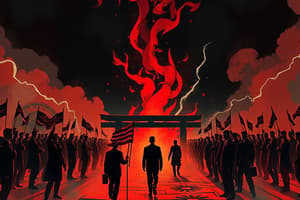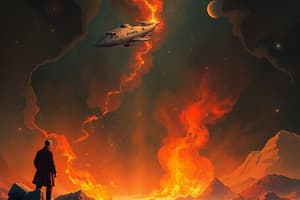Podcast
Questions and Answers
What is suggested by the phrase 'It was a bright cold day in April, and the clocks were striking thirteen'?
What is suggested by the phrase 'It was a bright cold day in April, and the clocks were striking thirteen'?
- It is a pleasant day in April.
- There's an unsettling and ominous vibe. (correct)
- The clocks are broken.
- It implies a futuristic society. (correct)
What does 'Victory Mansions' symbolize in the society depicted?
What does 'Victory Mansions' symbolize in the society depicted?
A false sense of appeal created by The Party.
What does the face of Big Brother represent?
What does the face of Big Brother represent?
- A figure of familiarity and security. (correct)
- An actual person in power.
- Total freedom.
- An illusion created by citizens.
Hate Week is a festival that promotes joy and happiness.
Hate Week is a festival that promotes joy and happiness.
What is the significance of the posters with Big Brother's face?
What is the significance of the posters with Big Brother's face?
_____ IS WATCHING YOU
_____ IS WATCHING YOU
What is notable about the radios in North Korea as mentioned in relation to the story?
What is notable about the radios in North Korea as mentioned in relation to the story?
What is the role of the telescreen in society?
What is the role of the telescreen in society?
Flashcards are hidden until you start studying
Study Notes
Opening Sentence Analysis
- "It was a bright cold day in April, and the clocks were striking thirteen" sets an unsettling tone, combining pleasant imagery with ominous elements.
- Clocks striking thirteen symbolizes a break from reality, hinting at the totalitarian regime's distortion of time and history.
- The phrase foreshadows Winston's future experiences and his struggle against an oppressive present where past and future are manipulated.
Victory Mansions
- "Victory Mansions" is a misleading name for dilapidated buildings, showcasing the Party's use of language to manipulate perception.
- The Party believes that controlling language can lead to controlling thought, highlighting an early instance of propaganda in the narrative.
Big Brother's Image
- A large, imposing face of Big Brother, described as ruggedly handsome, represents power and constant surveillance.
- This imagery serves to invoke a sense of familiarity while simultaneously reinforcing the notion of oppression within a totalitarian state.
Hate Week
- "Hate Week" reflects the society's embrace of organized animosity, challenging typical narratives where violence is masked by humanitarian rhetoric.
- This concept exemplifies the honesty in Oceania's depiction of aggression, suggesting a more extreme form of social control than in contemporary societies.
Ubiquity of Surveillance
- Big Brother's poster, present on every landing, symbolizes the omnipresent surveillance in Oceania.
- This constant reminder acts as psychological manipulation to deter rebellion against the Party.
Total Surveillance Maxim
- "BIG BROTHER IS WATCHING YOU" conveys an authoritative message of total control, emphasizing surveillance rather than care.
- The phrase reflects regimes' desires to create an image of an omniscient leader, instilling fear and compliance rather than familial comfort.
Telescreen Functionality
- The telescreen can be dimmed but never turned off, symbolizing the inescapable nature of surveillance.
- This aspect connects to contemporary discussions about government control and regulation of information, likening it to modern Internet monitoring.
Connection to Real-World Context
- The reference to North Korea hints at parallels between Orwell's dystopia and real-life authoritarian regimes where citizens are monitored and controlled.
- The narrative draws on historical and contemporary examples of surveillance, emphasizing ongoing struggles for freedom.
Studying That Suits You
Use AI to generate personalized quizzes and flashcards to suit your learning preferences.



